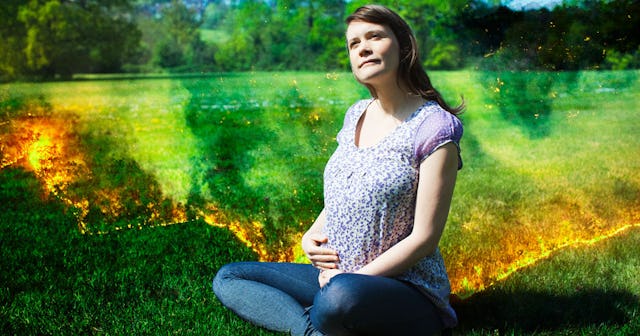As An Expectant Mom And Physician, I'm Worried About The Effects Of Extreme Heat

As I sat in the car waiting for my COVID-19 vaccine, I said a small prayer filled with gratitude — but also apprehension. I was five weeks pregnant, and the information on the risks and benefits of vaccination in pregnancy was still rather slim. However, my husband and I both believed that receiving the COVID-19 vaccine was the best choice.
Fast forward to long after my second dose, and thankfully, my baby and I are both healthy. Preliminary research has shown that, thus far, there are no major safety concerns during pregnancy, and with the rise of the Delta variant of COVID-19, I feel fortunate to have this extra layer of defense.
Yet, even as I celebrate protecting my child and myself from this terrible disease, the summer has brought another major health concern to the forefront: excessive heat. As I schedule my daily walks for the coolest times of day, I see that the timing of these temperatures is earlier, and the window to safely be outside is shorter. This comes as no surprise, considering the past decade was the hottest on record, and scientists predict that the number of dangerous, unmeasurable heat days will only increase in the next few decades.
While some may convince themselves that this drastic temperature change is earth’s natural response, scientists around the world agree that greenhouse gas emissions from human activity are a major driver of rising global temperatures. This increase in greenhouse gases like carbon dioxide has led the planet to absorb twice the amount of heat in the atmosphere when compared to fifteen years ago. The resultant positive energy imbalance then contributes to higher temperatures, severe droughts, and extreme heat.
For pregnant individuals like myself, severe heat waves pose dangerous health risks. Pregnancy already raises the body’s baseline temperature, but when pregnant people’s bodies reach temperatures of 102.2 degrees, they have a greater risk for heat stroke, heat exhaustion, and dehydration. Heat-induced dehydration can reduce blood flow to the placenta, potentially depriving fetuses of important nutrition. It can also lead to premature labor due to decreased blood flow to the uterus.
Marc Romanelli/Getty
This coincides with a study showing an association between high outdoor temperatures and an up to 21 percent risk of premature birth. In addition, for every one degree Celsius increase in the week before delivery during the months of May through September, there is a 6 percent greater chance of having a stillbirth. Extreme heat has also been linked to low birth weight and congenital heart diseases.
Unfortunately, the harms of extreme heat disproportionately impact communities of color. Black pregnant individuals are already more susceptible to preterm birth and low birth weight, and their risk for stillbirth is twice that of their white counterparts. Exposure to high temperatures only further exacerbates the risks of these outcomes. Several systemic issues contribute to these disparities. Communities of color are more likely to live in urban heat islands, urban regions that are significantly warmer than the surrounding rural areas. They have little tree cover and large amounts of sun-absorbing concrete, and many who live in these areas cannot afford the higher electrical bills that come with air-conditioning. These inequities are further compounded by factors like Black patients having less access to healthcare and experiencing racial bias in treatment.
In order to protect pregnant people and their babies, urgent and equitable action to combat climate change must be taken. Building green spaces is one way to help counteract extreme heat, but planning must include the needs of disadvantaged communities. Energy-efficiency programs, which are designed to reduce energy use and the cost of utility bills, should take into account the structural challenges the most vulnerable residents often face. In addition to President Biden’s Bipartisan Infrastructure Framework, which invests in clean transportation and power, legislation like the Protecting Moms and Babies Against Climate Change Act specifically addresses the environmental health injustices that accompany maternal mortality.
For myself, the joy of bringing a child into this world is tempered by the concern that comes with ensuring I do everything in my power to help my baby thrive. Even as I try to do what I can, I think about how health hazards like extreme heat could derail these efforts. But what I hope for myself and countless others like me is that through real climate action, we can eventually bring our children into a world that is safe and healthy for all of us.